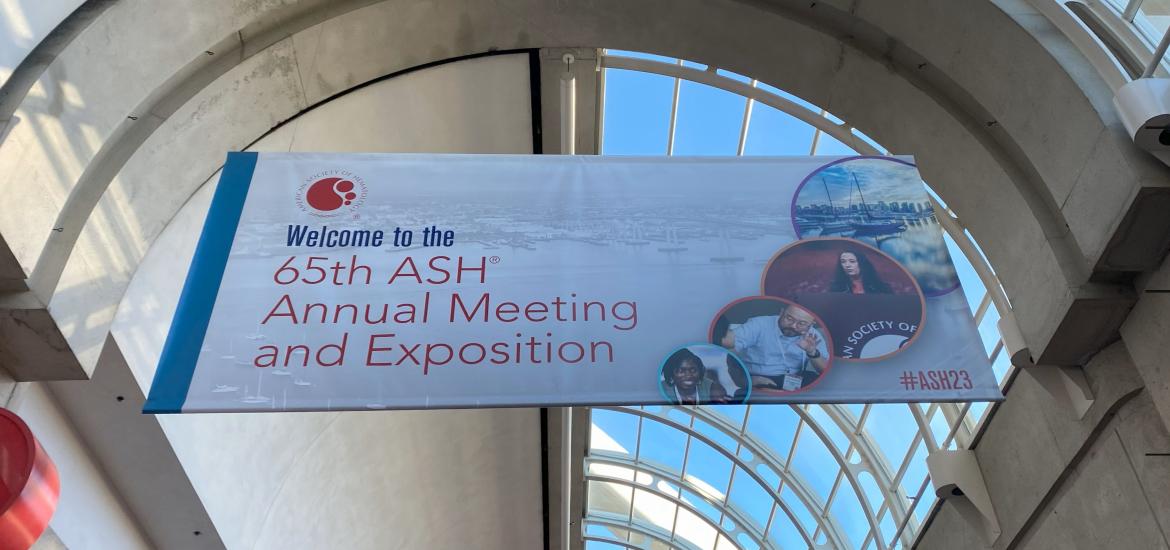
ASH 2023 – the search for a better Ayvakit
Blueprint looks to a next-gen Ayvakit, while Cogent challenges with a molecule acquired from Daiichi Sankyo.
Blueprint looks to a next-gen Ayvakit, while Cogent challenges with a molecule acquired from Daiichi Sankyo.

Blueprint developed and launched Ayvakit as the first inhibitor of KIT D816V kinase for indolent systemic mastocytosis, and now it’s highlighting a next-generation non-brain penetrant molecule, elenestinib, as the next big thing in this rare, slow-growing mast cell disease.
It’s not alone, however, and the ASH conference today saw elenestinib’s Harbor study square off against the Summit trial of Cogent Biosciences’ similarly acting bezuclastinib. Both molecules appear to be efficacious – though cross-trial comparisons are complicated by lack of uniformity in reporting disease symptom improvements – and safety could be the real differentiator.
It was a possible toxicity with Ayvakit – its label warns of intracranial haemorrhage – that led to the search for next-gen compounds. Presenting the Harbor data Dr Tsewang Tashi, of University of Utah, said the chances of a brain bleed with a non-CNS penetrant molecule like elenestinib were “probably none”.
The hope is that this quality, plus the ability to hit D816V mutant KIT specifically and hard, might dial up efficacy. Symptom improvement is now established as the key measure of such efficacy in indolent systemic mastocytosis, and Blueprint has established its own multi-symptom score, called ISM-SAF.
It was largely on the basis of ISM-SAF in the Pioneer trial that Ayvakit was approved, and on a cross-trial basis elenestinib’s Harbor showed deeper changes in ISM-SAF, albeit with a higher placebo response too. Importantly, there was a neat dose-response in all symptom metrics across the 25mg, 50mg and 100mg QD doses presented.
Most adverse events were grade 1 or 2, and no patients discontinued because of an adverse event, Tashi told ASH.
In Cogent’s case no ISM-SAF data were given, with MD Anderson’s Dr Prithviraj Bose instead presenting efficacy in terms of the more traditional markers serum tryptase, peripheral blood KIT D816V and bone marrow mast cell burden. Though comparisons are difficult here it’s clear to see that bezuclastinib is active.
Cross-trial comparisons in indolent systemic mastocytosis
| Ayvakit (Blueprint) | Elenestinib (Blueprint) | Bezuclastinib (Cogent) | |
|---|---|---|---|
| Trial | Pioneer | Harbor | Summit |
| Mean decrease in ISM-SAF | 30% vs 3% | 29-34% vs 22% | (not given) |
| ≥50% decrease in serum tryptase | 54% vs 0% | (not given) | 100% vs 0% |
| Mean decrease in serum tryptase | (not given) | 15-68% vs increase of 3% | (not given) |
| ≥50% decrease in peripheral blood KIT D816V | 68% vs 6% | (not given) | 100% vs 0% |
| Mean decrease in peripheral blood KIT D816V | (not given) | 38-77% vs 3% | (not given) |
| ≥50% decrease in bone marrow mast cells | 53% vs 23% | (not given) | 100% vs 14% |
| Mean decrease in bone marrow mast cells | (not given) | 23-58% vs 20% | (not given) |
Note: placebo is the comparator for all the above figures. Source: prescribing information & ASH.
However, it’s on safety that bezuclastinib looks somewhat questionable. Bose was presenting data on just part 1A of Summit, comprising 100-200mg daily doses. A 400mg dose had been tested, but this was discontinued after a patient experienced grade 4 neutropenia.
And there were two dose reductions needed in 100-200mg cohorts, with one discontinuation due to ALT increase. Bose said Cogent was now focusing on Summit’s part 1B, which tests a new bezuclastinib formulation optimised for improved bioavailability.
Cogent is a company notable for having been set up by some of the management who sold Array to Pfizer in 2019, and it obtained a Nasdaq listing by reversing into the shell of Unum Therapeutics in 2020. Bezuclastinib, its lead asset, has an interesting history, having been originated, under the code PLX9486, at Plexxicon/Daiichi Sankyo.
Clearly the focus is now on safety, and here all eyes will turn to whether the new formulation can make bezuclastinib more competitive versus elenestinib. The first data from Summit’s part 1B should emerge early next year, with part 2 (dose expansion) set for the second half of 2024.
This story has been updated to correct the ISM-SAF numbers for Ayvakit.
1545













